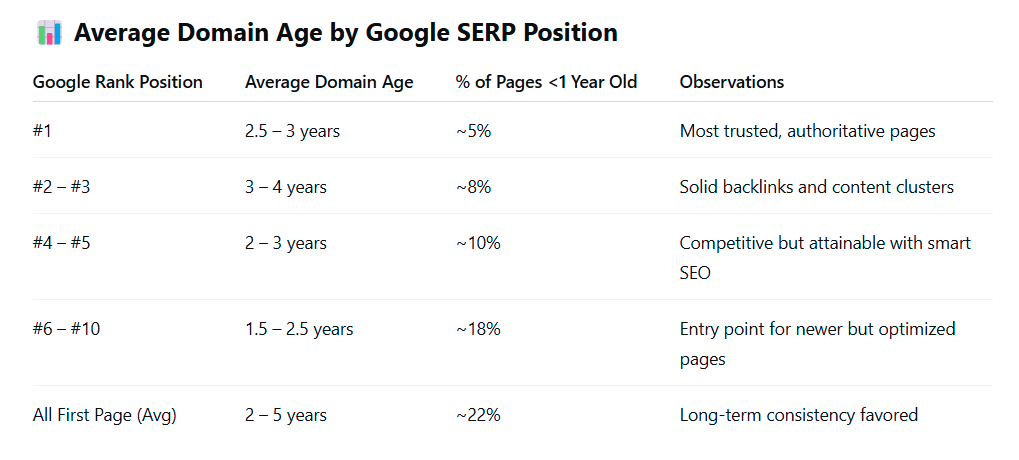What’s the Average Domain Age on Google’s First Page — And Why It Matters
When it comes to ranking on Google’s first page, domain age is often discussed as a key factor, but does it play a role? The short answer: yes, but indirectly. The long answer involves understanding the nuances of how Google evaluates trust, authority, and relevance over time.
The Average Domain Age of First Page Results
Several independent studies have consistently found that the average age of domains ranking on Google’s first page is between 2 to 5 years.
A comprehensive study by Ahrefs analyzed 2 million keyword searches and revealed:
- Only 22% of pages in the top 10 were less than a year old.
- The average age of a #1 ranking page was 2.6 years.
- The top 3 ranking pages were typically older than 3 years.
Breakdown by Rank (From Ahrefs Data):
| Position | Average Domain Age |
|---|---|
| #1 | 2.6 – 3 years |
| #2–3 | 3 – 4 years |
| #4–10 | 2 – 3 years |
| New domains (<1 year) | <20% of first-page results |
This indicates a clear correlation between domain age and higher rankings, although it’s not a direct ranking factor.
Why Does Domain Age Influence Rankings?
Google has confirmed that domain age itself is not a direct ranking factor, but the age of a domain often correlates with:
1. Established Authority
Older domains tend to accumulate:
- Backlinks from trusted sources
- Brand mentions across the web
- User signals like time-on-site and click-through rate
All of these are strong indicators of authority, which are ranking factors.
Fact: A domain that’s been publishing content consistently for years is more likely to be seen as trustworthy than a brand-new site with zero history.
2. Content Depth and Consistency
Older domains usually have:
- Published more content
- Refined their SEO practices
- Built topic clusters over time
This builds topical authority, which Google’s algorithms, like BERT and Helpful Content Update, reward heavily.
3. User Trust and Behavioral Data
With time, a site:
- Builds repeat visitors
- Increases direct traffic
- Improves brand recognition
Google interprets these as positive engagement signals, boosting rankings.
Why New Domains Struggle
- No history = no trust
Google operates on trust. A new domain has no established pattern of quality. - Lack of backlinks
Backlinks remain one of the strongest signals for ranking. New domains simply haven’t had the time to build them. - Sandboxes & Testing Phases
Google often tests new pages in lower positions to evaluate user engagement before allowing them to climb.
Does That Mean You Need an Aged Domain to Rank?
Not necessarily. Google has also stated that “a great page on a new site can outrank an older site with poor content.”
Here’s how newer domains can still win:
- Publish exceptional, helpful content
- Build high-quality, relevant backlinks
- Optimize for search intent and UX
- Be consistent over 6–12 months
Note: Many niche-focused websites have ranked in under a year — but those are often exceptions built on top-tier strategy and content.
Key Takeaways

- 2 to 5 years is the average domain age of top-ranking pages.
- Domain age isn’t a direct ranking factor — but authority and trust built over time are.
- Older domains have the edge due to:
- Backlink profiles
- Content depth
- Brand presence
- New domains can still win with the right SEO and content strategy — it just takes time, consistency, and precision.
Final Word
If you’re building a new website, don’t obsess over domain age. Focus instead on building real authority:
✅ Solve user problems
✅ Publish quality, in-depth content
✅ Earn backlinks through outreach and value
✅ Stay consistent for 12+ months
Time is your ally — if you invest it wisely.



